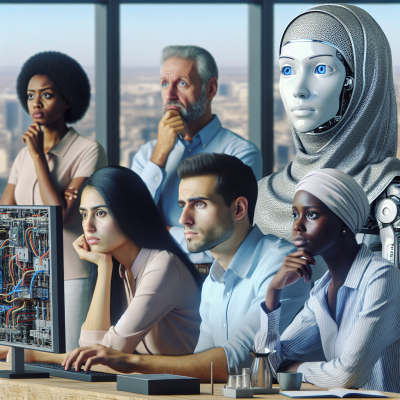
The Growing Impact of AI on Ireland’s Workforce
As artificial intelligence continues to advance at a rapid pace, its influence on jobs and employment patterns has become impossible to ignore. In Ireland, recent discussions have brought the transformative — and potentially disruptive — effects of AI to the forefront. With industries adapting to technological change, the question is no longer whether AI will impact jobs, but how deeply and how quickly.
AI’s Dual Nature: Opportunity and Disruption
AI holds tremendous promise for economic growth, productivity, and innovation. However, it’s also a technology of dual consequences — while it has the potential to create new roles and industries, it is equally poised to displace existing ones.
According to a parliamentary report discussed this week, Ireland could see tens of thousands of jobs affected by AI technologies over the next decade. The findings highlight sectors such as customer service, retail, transportation, and manufacturing as high-risk areas where automation could replace routine and repetitive labor.
Jobs at Risk: Key Sectors Identified
The parliamentary report outlines several sectors that face significant disruption:
- Retail: Automation in inventory management and cashier services threatens traditional roles.
- Customer Service: AI chatbots and automated systems continue to replace human interactions.
- Transport and Logistics: Autonomous vehicles and smart routing systems could challenge trucking and delivery jobs.
- Manufacturing: AI combined with robotics is reducing the need for human labor in production lines.
While many of these roles are essential parts of the economy today, they involve tasks that AI can perform more cost-effectively and with fewer errors.
AI Isn’t Just Automation — It’s Transformation
Some experts caution that the immediate focus on job losses overshadows the broader revolution in how work is done. Rather than simply replacing human workers, AI can alter existing roles, allowing workers to focus on tasks that require emotional intelligence, creativity, and interpersonal skills.
For instance, in healthcare and education, AI tools are helping professionals manage administrative tasks more efficiently, freeing them for human-centered responsibilities that machines cannot replicate. In finance and law, AI is streamlining research and data analysis, letting professionals concentrate on strategic decision-making and client relations.
Shifting Skills and the Need for Reskilling
With growing automation, Ireland faces an urgent need for strategic investment in upskilling and education. The key challenge is to match workers displaced by AI with emerging opportunities in AI-driven sectors.
The government has already committed to supporting lifelong learning and technical training. Réamonn O’Briain, who led the parliamentary group’s investigation into AI impacts, emphasized the necessity of “a national response to a global issue.” He called for collaboration between policymakers, educational institutions, and employers to future-proof the workforce.
Skills increasingly in demand include:
- Data literacy and analytics
- Programming and machine learning skills
- Digital content creation and marketing
- Cybersecurity and IT infrastructure
- Leadership and human-centric roles like counseling or teaching
Government and Industry Must Work Together
The report highlighted the importance of proactive policy-making to ensure that Ireland’s AI transition is inclusive and equitable. One of the recommendations includes the creation of an “AI Transition Taskforce” — a collaborative body that would guide policy, monitor job displacement trends, and oversee training initiatives.
Moreover, companies adopting AI are encouraged to plan better transition pathways for their workforce. Rather than using AI purely for cost-cutting, businesses should view it as a catalyst for innovation and employee enablement.
Examples of Positive Industry Response
Some Irish firms are already setting positive examples:
- A major insurance company in Dublin has rolled out an AI-powered claims processing system, but also launched a training program to help employees transition into customer advisory roles.
- A Cork manufacturing plant automated its production line but retrained line workers to become process engineers or system quality monitors.
These examples show that with proper foresight and investment, AI can augment rather than displace.
The Road Ahead: Embracing AI with Responsibility
Artificial intelligence will undoubtedly reshape Ireland’s economic landscape. The challenge lies in managing this transformation in a manner that balances efficiency with compassion. Policymakers must stay ahead of the curve, educators must evolve curricula at pace, and businesses must remain human-focused, even as they integrate AI into operations.
For workers, the key takeaway is clear: adaptability is no longer optional. In an AI-powered world, lifelong learning is not an advantage — it is a necessity.
Conclusion: Striking a New Social Contract
As Ireland stands on the cusp of a new technological era, it must strike a new social contract that protects its workers while nurturing innovation. AI is not the end of work — but it is the end of work as we know it. Forward-thinking strategy, empathetic leadership, and inclusive growth will be essential to harness AI’s potential while minimizing its pitfalls.
Artificial intelligence may be the defining technology of our time — but the way we prepare for it will define our society.


Leave a Reply